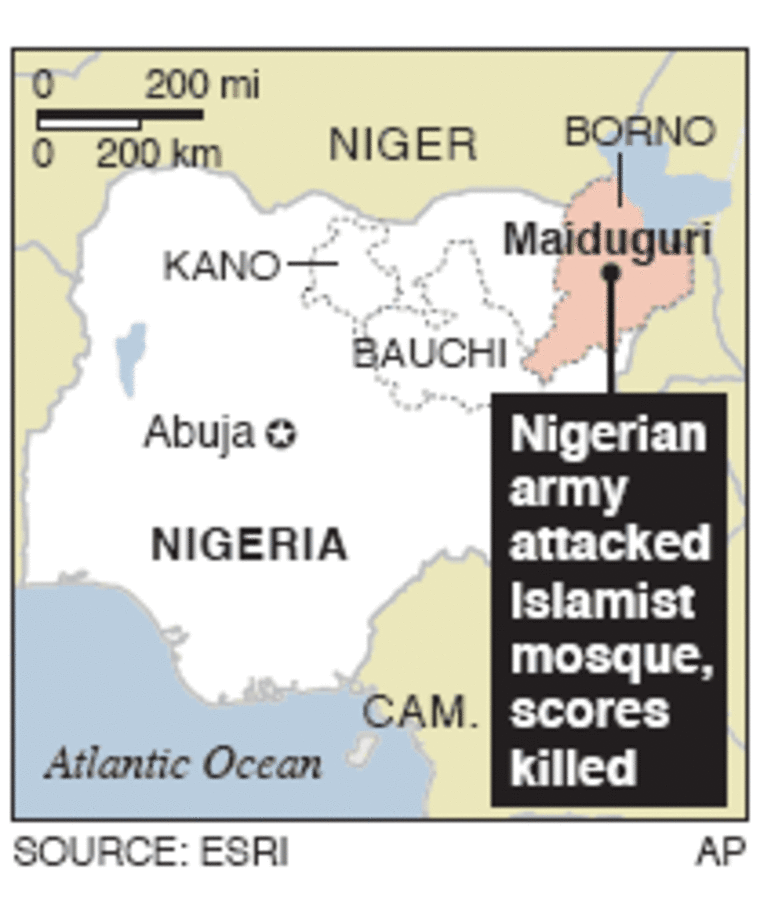Lecturers tore up their degrees and abandoned universities to join him. Others bankrupted themselves, selling cars and other valuables to honor his call to give up Western trappings for the sake of Islam.
Thousands made such sacrifices for Mohammed Yusuf, leader of a group sometimes called the Nigerian Taliban. The 39-year-old was shot and killed Thursday in police custody after being found in a goat pen at the home of his in-laws.
Yusuf had escaped with some 300 followers as troops shelled his compound in the northern city of Maiduguri on Wednesday, killing some 100 members of the sect.
Yusuf's death could provoke more violence. Though his followers in the Boko Haram sect may be in disarray — some lieutenants fled and others were arrested — the decades-long grievances that caused followers to flock to his cause remain.
Anti-Western agenda
The sect, with its anti-Western agenda, had been gathering disciples for years in Nigeria, a major oil producer and Africa's most populous nation.
Yusuf, a Western-educated member of the country's elite, encouraged his followers to rid themselves of all material wealth while he was chauffeured around in a Mercedes all-terrain vehicle and amassed dozens of vehicles at his compound.
A university graduate who spoke excellent English, he has discounted Darwinism, claimed the world cannot be round because the Koran does not say that and credited Allah with creating rain.
"We believe (rain) is a creation of God rather than an evaporation caused by the sun that condenses and becomes rain," he said in a BBC interview.
Militants with Boko Haram — which in the local language means "Western education is sacrilege" — attacked police stations, churches and government buildings in a wave of violence that began Sunday in Borno and quickly spread to three other northern states. The group is seeking the imposition of strict Islamic Shariah law in Nigeria, a multi-religious country.
The fighting was the first by the group since December 2007. Nigeria's military thought it annihilated the sect back then after it attacked police outposts in two northern states. But apparently it had just gone underground to prepare for something catastrophic.
Nnamdi K. Obasi, a Nigerian analyst with the International Crisis Group, said some members of the group have fought alongside the Taliban in Afghanistan and staunch supporters travel to Iraq and Sudan for inspiration. But their favored destination is Iran, which is considered almost a pilgrimage, he said.
Disappointed by Shariah law
Most sect members are young, disgruntled people. Although most are poor and unemployed, some come from highly educated and elite families. They are angry that the introduction of moderate Shariah law in 12 northern states 10 years ago has not halted the corruption that keeps most Nigerians impoverished while a coterie of millionaires prosper from the country's prodigious oil wealth.
"Those who were excited about the possibility of Sharia have been disappointed. Corruption ... did not stop when it came in," says Junaid Mohammed, a former member of Nigeria's parliament.

In its strictest application, Shariah dictates a kind of social welfare system with compassionate treatment for poorer members of society.
The sect abhors everything Western, including science, and blames British colonization and Western values for destroying their culture.
They would return to the "purity" of rule by a Muslim caliphate, topple Nigeria's government and impose strict Shariah law throughout this nation of 140 million people who speak more than 200 languages and are roughly divided between northern Muslims and Christian southerners.
That is unlikely given the group's small numbers, its bases only in northern Nigeria, the nation's largely secular leanings and the sect's primitive armory of homemade hunting rifles, firebombs, bows and arrows, scimitars and machetes.
But they can create mayhem.
For three days this week they tied down thousands of troops and police until security forces shelled their headquarters Wednesday night and then stormed their mosque.
President Yar'Adua said he ordered attacks this week after Yusuf called followers from other states to his headquarters, preparing to unleash jihad, "the holy war."
Thousands of followers?
No one knows precisely how many followers Yusuf has, but they are estimated in the thousands. Obasi said Yusuf seemed to have several hundred core followers in the capitals of 12 northern states and a few thousand supporters in each urban center. The sect is strongest in the northeast states of Borno, Bauchi and Yobe.
Like Palestinian militants — to whom they are not known to have ties — Yusuf's followers believe the greatest honor is to die fighting for their cause, Obasi said.
Yusuf won some unlikely converts. Like Musa Kabir, a lecturer at Bauchi's Abubakar Tafawa Balewa University who six months ago publicly shredded his master's degree in engineering.
"I now understand that it is not right for me to hold anything that portrays Western education or culture," he declared.
In their zeal to give monetary support to their cause and rid themselves of Western trappings, people have sold their homes and vehicles.
"The ideology of the group says get rid of material possessions, even a wristwatch; that these Western things have been created to divert you from your course of worshipping Allah," Obasi explains.
Some accuse the group of using doctored palm dates and wooden chewing sticks to charm people into their circle.
"Some people were forcefully coerced to join after they ate those dates," says Ibrahim Gumai, a retired civil servant and small businessman who used to be close to sect leaders.
Obasi has not heard about the dates, but says "there is talk about the use of magical methods, casting spells on people ..."